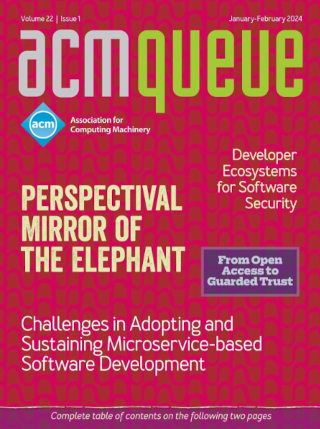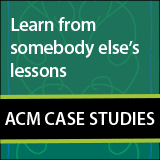George Neville-Neil, Queue's Kode Vicious, interviews Robert to learn about an exciting computer science research project at Cambridge.
Amanda Casari, Julia Ferraioli, Juniper Lovato - Beyond the Repository
Much of the existing research about open source elects to study software repositories instead of ecosystems. An open source repository most often refers to the artifacts recorded in a version control system and occasionally includes interactions around the repository itself. An open source ecosystem refers to a collection of repositories, the community, their interactions, incentives, behavioral norms, and culture. The decentralized nature of open source makes holistic analysis of the ecosystem an arduous task, with communities and identities intersecting in organic and evolving ways. Despite these complexities, the increased scrutiny on software security and supply chains makes it of the utmost importance to take an ecosystem-based approach when performing research about open source.
Guenever Aldrich, Danny Tsang, Jason McKenney - Three-part Harmony for Program Managers Who Just Don't Get It, Yet
This article examines three tools in the system acquisitions toolbox that can work to expedite development and procurement while mitigating programmatic risk: OSS, open standards, and the Agile/Scrum software development processes are all powerful additions to the DoD acquisition program management toolbox.
Jessie Frazelle - Open-source Firmware
Open-source firmware can help bring computing to a more secure place by making the actions of firmware more visible and less likely to do harm. This article’s goal is to make readers feel empowered to demand more from vendors who can help drive this change.
Marshall Kirk McKusick, George V. Neville-Neil - Thread Scheduling in FreeBSD 5.2
A busy system makes thousands of scheduling decisions per second, so the speed with which scheduling decisions are made is critical to the performance of the system as a whole. This article - excerpted from the forthcoming book, “The Design and Implementation of the FreeBSD Operating System“ - uses the example of the open source FreeBSD system to help us understand thread scheduling. The original FreeBSD scheduler was designed in the 1980s for large uniprocessor systems. Although it continues to work well in that environment today, the new ULE scheduler was designed specifically to optimize multiprocessor and multithread environments. This article first studies the original FreeBSD scheduler, then describes the new ULE scheduler.
Robert Watson is a security researcher and open source developer at the University of Cambridge looking at the hardware-software interface. He talks to us about spanning industry and academia, the importance of open source in software research, and challenges facing research that spans traditional boundaries in computer science. We also learn a bit about CPU security, and why applications, rather than operating systems, are increasingly the focus of security research. What are the challenges in the evolving hardware-software interface? Could open source hardware provide a platform for hardware-software research? And why is current hardware part of the problem? George Neville-Neil, Queue's Kode Vicious, interviews Robert to learn about an exciting computer science research project at Cambridge.
Comments
(newest first)
Thanks for the excellent interview with an interesting, cutting-edge researcher. My one gripe is that the questions are posed in text only within the video, ie: not read aloud. I understand that the idea is to keep the focus on Mr. Watson, but it prevents an audio-only consumption which should be possible given the fact that the video component is strictly portrait-based.
Excellent video. For too long, there has been an almost complete cultural divide between hardware designers and software engineers. I hope this interview helps to eliminate this wholly unnecessary gap, and move us towards a more organic "whole system" view of computation and security.
This is a marvelous interview. Very insightful and far-sighted. This really brings home the importance of understanding hardware, software, programming languages, system engineering, networking, security, reliability, and so many other aspects of computer research and development. It should be seen by every ACM member and others as well.





